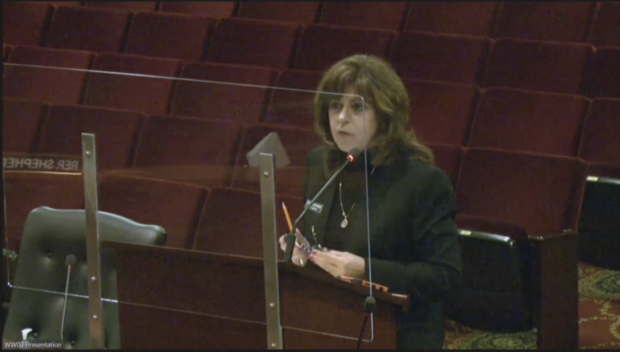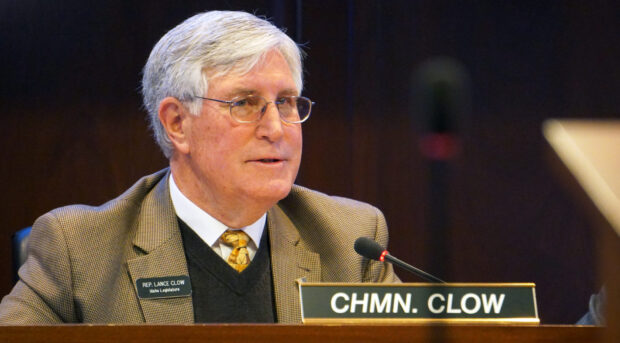The House Education Committee advanced a bill Wednesday to allow school districts to decide whether to participate in labor negotiations with the local teachers’ union.

Rep. Dorothy Moon, R-Stanley, pushed House Bill 174 with a memorable introduction that succinctly summarized the bill.
Moon said her bill “is notoriously referred to as the shall-to-may bill.”
That’s because Moon’s bill changes just one word in state law. It would amend the existing section of law outlining negotiations between education associations and school districts.
If Moon’s bill passes, the section of law that says districts and the education associations “shall” enter into a negotiation agreement would be changed to say districts “may” enter into an agreement.
“This legislation would give school boards the flexibility to decide to engage in collective bargaining with the local education association,” Moon said.
As things stand, districts and local teachers unions meet every spring in an open session to negotiate salaries and benefits. Districts are empowered to ask the union or education association to document that it represents a majority of the employees in order to negotiate.
If the bill passes, districts could implement salaries and benefits without having to negotiate or agree with teachers’ representatives.

Although the bill advanced, the committee’s Republican chairman and vice chairman argued passing the bill could hurt relationships between teachers and schools boards. Those relationships have been healing over the past decade since the introduction and ultimate voter repeal of the Students Come First laws, also dubbed “the Luna laws” for previous state superintendent Tom Luna.
“In many respects, my biggest concern is respect for the teachers and recognizing the morale this might impact,” said House Education Committee Chairman Lance Clow, R-Twin Falls. “One of the things about the current situation is I think it does bring stability to schools, I think it brings stability to the classrooms.”
The Idaho Education Association and about a dozen current or retired teachers opposed the bill, while the Idaho Freedom Foundation and some parents supported it.
During the hearing it became clear many supporters backed the bill in response to the West Ada Education Association’s October teacher sickout to protest district plans to offer hybrid, in-person classes while Ada County was in the highest risk category for coronavirus. Hundreds of teachers called in sick, and the district abruptly canceled school for two days because it couldn’t find enough substitute teachers to cover the absences.
However, West Ada’s sickout wasn’t part of labor negotiations between the district and union — the agreement was already in place for the year. It also isn’t clear that passing HB 174 would block a future sickout attempt. The West Ada Education Association announced the sickout during a virtual meeting of its members, not during labor negotiations or a school board meeting.
HB 174 heads next to the House floor with a recommendation it passes.
Little on failed preschool grant proposal: ‘We’ll try again’
Gov. Brad Little said he was “disappointed” that the House killed a $6 million federal grant for early education Tuesday, but Little said he was not dissuaded from his early education push.
“The evidence is overwhelming that what we do for these kids early is good for Idaho and good for our students, and we’ll try again,” Little told reporters in an annual breakfast meeting hosted by the Idaho Press Club.
The House killed House Bill 226, which would have granted the State Board of Education permission to spend the federal grant money in partnership with the Idaho Association for the Education of Young Children.
Conservative Republicans attacked the program over a fear that the Idaho AEYC, and its national affiliate, the National Association for the Education of Young Children, would attempt to indoctrinate young children with “social justice ideology.” Idaho AEYC director Beth Oppenheimer, and sponsors of HB 226 said those concerns were unfounded.
“This grant is 100 percent about local control,” said Rep. Paul Amador, the Coeur d’Alene Republican who sponsored the bill.
As of Wednesday morning, Little said he hadn’t spoken with the State Board about alternative plans to secure the federal funding. He did signal that the request might not be completely off the table: “We’ll work at the Legislature to try and address their concerns.”
Supporters of the early education program planned to stage a “Stand Up for Idaho Women” rally at the Statehouse Wednesday afternoon.
Guns-in-schools bill on hold
The Senate State Affairs Committee put a guns-in-schools bill on hold Wednesday.
The committee held Senate Bill 1135, which would rework the state law that allows employees to carry a firearm on school grounds, with the permission of local school trustees.
Among the proposed changes in SB 1135: Employees who carry a firearm would need to have an enhanced concealed carry license, and receive “ongoing training” as directed by trustees.
While Senate State Affairs held SB 1135 Wednesday, it could still come back later in the session, said Idaho Association of School Administrators Executive Director Andy Grover, the bill’s sponsor.
SB 1135 is one of two guns-in-schools bills before the Legislature. House Bill 122, sponsored by Rep. Chad Christensen, R-Iona, would allow employees with an enhanced concealed carry license to bring a firearm on school grounds, with or without permission of trustees. The House State Affairs Committee has not held a hearing on this bill.
Loan repayment bill dies
A divided Senate Education Committee killed a bill that would have created a student loan repayment program for rural teachers.
An attempt to address Idaho’s chronic teacher shortages, Senate Bill 1117 would have allowed rural teachers to get loan assistance for up to four years, provided they continued to work in the same district. Roughly 8,000 teachers would have been eligible for the program, which carried a potential taxpayer cost of $1 million a year.
Senate Education killed the bill on a 5-4 vote.
The loan repayment bill was co-sponsored by two Democratic lawmakers: Sen. Janie Ward-Engelking, a retired teacher from Boise; and Rep. Sally Toone, a Gooding teacher. Ward-Engelking and Toone have pushed similar rural teacher retention bills in past sessions.
Idaho Education News reporter Sami Edge contributed to this report.
Idaho Education News covered Wednesday’s hearings remotely.
